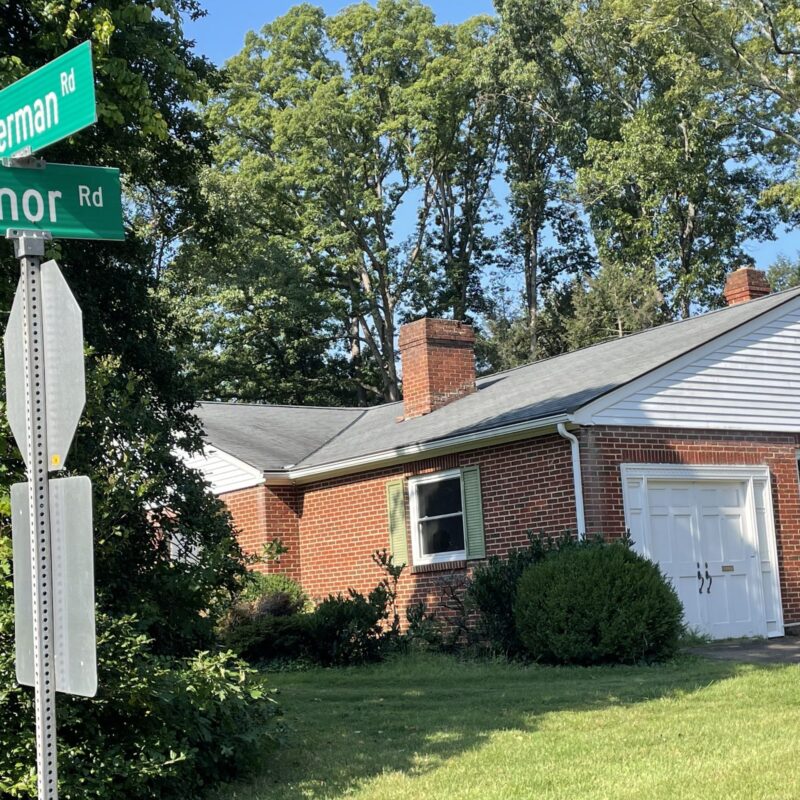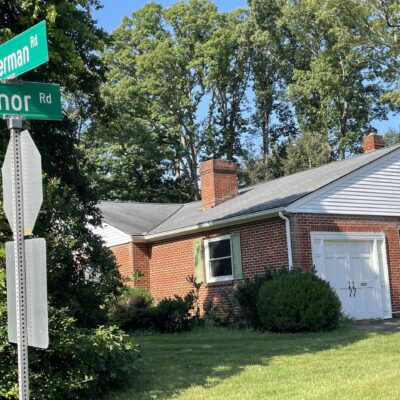|
JUMP TO: • Kevin Lynch |
Two words: Status quo. They’re enough to stir these five local agitators to, well, agitate. Whether standing up for tenants’ rights, protesting a road or a water supply plan, rallying for gay marriage rights, or watching what you put into your mouth, these five people don’t settle for things as they are. With 2009 upon us, we expect to hear a lot more from these noisemakers, and they hope that you will listen up.
Kevin Lynch:
Dreaming of a world class city
For Kevin Lynch, activism is a family affair. While growing up in Alexandria, his parents started that area’s first community gardens and protested to save public parks. Helping them to agitate was all in a day’s work.
“The bike path that goes from Mount Vernon to D.C., when I was 10 years old, I was shoveling gravel on that bike path,” he says, smiling proudly. That very sense of service has stayed with Lynch in the years since, establishing him as a controversial and outspoken figure both on Charlottesville City Council and off Council as a very agitated critic of a water plan that earned his endorsement when he was an elected official.
|
Kevin Lynch has been off City Council since 2007, but he remains as vocal as ever about what needs fixing in Charlottesville, especially the water supply issue. |
Lynch, 46 years old, moved to Charlottesville in 1980. Once he had his degree in electrical engineering from UVA, he began to wonder what else the world offered. It turned out to be Charlottesville itself. “When I graduated from school here, I figured I would stay here until I found another place to live, and I lived in two dozen different places but I haven’t found a better place than this,” he says. And he started thinking what those other cities had that would make this city even better.
“We call ourselves a world class city and there are a lot of things that are unique and interesting and great about Charlottesville,” he says. “But for the most part, we are not nearly close to what we think we are. We have the potential to get there, I think.”
Before running for City Council in 2000 and winning a seat as a “Democrat for Change” advocating alternative transportation, Lynch was the president of the Federation of Neighborhoods, an overarching citizen-driven organization whose goal was to bring city residents’ concerns to light.
“At the time, the commercial areas were growing out in all the neighborhoods around the Mall, and they were feeling the pressure of rezoning. It was part of, I guess, the new urban movement,” he says. His idea of growth mimics what he has seen in his hometown throughout the years, “growth based on transit-oriented development; supporting a lot of businesses; don’t spread out into the neighborhoods, but still have some connections from the neighborhoods.”
Lynch says he wasn’t “crazy” about the idea of running for City Council, but he knew he had to do something to “fix the wrongs,” many of them road- and transit-centered.
The free trolley was one of his first victories, followed closely by a denser zoning program around the University that has yielded affordable units in the County.
Though he’s been off the Council since 2007, Lynch seems as driven as ever, if not more so, to be the fixer-upper, even if that means using blunt tools like insults and what some might consider injudicious charges. Which gets us to the water supply issue.
In 2002, Charlottesville and Albemarle had to face the fact that water supply projections had the area nearly running dry by 2050.
Plans needed to be made to avoid that outcome. After plenty of wrangling, the Rivanna Water and Sewer Authority (RWSA) adopted a $13 million plan that would expand the area’s water supply by raising the height of the dam on the South Fork Rivanna Reservoir.
“We passed a plan…which was a pretty long and drawn-out process and…a lot of community activity went into that,” he recalls. “That’s the plan we financed. That’s when we raised the rates, and over a period of two or three years, we nearly doubled the water rates. And we took a lot of heat for that.”
But that heat is mild compared to the firebombs that Lynch has thrown since.
In 2006, as a city councilor, Lynch voted for a 50-year water supply plan that included the expansion of the Ragged Mountain Reservoir and the construction of a pipeline. The plan was passed unanimously by city and county.
But for the past year or so, as a civilian, Lynch has been calling the plan “environmentally irresponsible.” In an earlier story in C-VILLE, Lynch, who is now in favor of dredging the South Fork, says it is not “sustainable” to build a big reservoir when another one is filled to capacity.
“Why do we need to spend $142 million? Really the only redeeming feature of this plan is that Rivanna’s engineers get to play Tonka toys for the next 10 years. That’s a lot more sexy than dredging,” he said in an interview earlier in the year.
Water remains Lynch’s calling. Maybe because of his training as an engineer, maybe because water is a luxury we can’t take for granted, but regardless of the motivation, Lynch will positively be a vital player in all things connected to the current battle over H2O.
Deborah Stockton:
Guarding against the farming industrial complex
Deborah Stockton has been at the forefront of the direct farming rights campaign for the last seven years. She edits the VICFA VOICE newsletter for the Virginia Independent Consumers and Farmers Association, the group that leads the local campaign to reform food and agriculture regulations.
As such, she’s getting out the message about VICFA’s latest battle against the federal government: a proposal that all livestock farms be required to register and tag animals with radio transmitters. The National Animal Identification System (NAIS) was created, ostensibly, to prevent and track the spread of disease among herds. But Stockton, 49, is not buying it.
|
Deborah Stockton, who edits the VICFA VOICE newsletter for the Virginia Independent Consumers and Farmers Association, says, “Our goal is always to increase the direct relationships between farmers and their neighbors.” |
“[The measure] is based on erroneous information,” says the former musician and music teacher. The disease of choice is scrapies, a fatal, degenerative disease that affects the central nervous system of sheep and goats. “Their idea of this eradication program is that if they find a diseased animal within a herd, they slaughter the entire herd, which means that you are killing healthy animals on the pretext of eradicating a disease.” Stockton believes this is not a public health issue, but, rather, a federal mandate to eliminate small farmers.
“Our goal is always to increase the direct relationships between farmers and their neighbors,” says Stockton. From the time when she joined VICFA in 2000, Stockton has seen real and practical progress. “Charlottesville has a wonderfully responsive community and people who more and more value what they are able to purchase directly from local farmers,” she says. “What we want most of all is to empower more people, and that is happening.
“I am not an utopian,” she says. “I believe very strongly if you want to live in a world where you enjoy certain freedoms, you have to create and maintain and protect those freedoms.” By the same token, if people want access to what Stockton calls “real food,” meaning food from a local farm, people have to maintain it and protect it. And while it might look that way at times, buying and eating locally is not just a fancy trend. It was three years ago that the Piedmont Environmental Council launched Virginia’s first Buy Fresh Buy Local campaign with the goals of supporting local farmers and helping consumers find locally grown food.
“I don’t think anybody with a straight face can say that there is no difference between farm fresh food and industrial food. Nobody who has a conscience,” says Stockton. But there lingers a notion that a direct sale from farmer to consumer is potentially unsafe. About 70 million cases of food poisoning or food-borne illnesses have occurred in the country, but, Stockton insists, “that food is not coming from somebody’s kitchen or somebody’s farm.
“How many tons of recalled beef did we have last year? And it was all USDA-inspected meat.”
Stockton gets fierce on the question of NAIS and the path it would clear for increased regulations: “That will be the end of family farms, local food and any agriculture except industrial, corporate-owned and -driven.
“We’ll continue to challenge scrapies regulations in court, and we will continue to fight NAIS at every level,” she promises.
The fight may now have to be intensified. On January 13, the USDA proposed an amendment to the current livestock regulations that would make enrollment in all forms of animal identification mandatory in many federal programs that research and control animal disease.
If approved, Stockton says, the amendment would be critically close to a universal registration mandate for all farms with livestock. All farms would have to register their animals with the federal government. Adieu, independence.
“We are preparing our response,” says Stockton.
Joy Johnson:
Powerlessness is a myth
In her office at the Westhaven Nursing Clinic, Joy Johnson is busy. “I’m sorry,” she says. “I have an emergency I need to fix.” She picks up the phone and in a matter of minutes the emergency is handled. A longtime resident of Charlottesville public housing and mother of four, Johnson is one of those people who relentlessly tries to fix what’s broken by making every wrong a personal battle. Johnson knows how to navigate the public housing system better than most: She could recite excerpts from the Department of Housing and Urban Development manual from memory.
Johnson’s leadership developed over time. Born in Kingston, Jamaica, Johnson moved to Charlottesville while in her teens. In 1983, she moved into Westhaven on Hardy Drive and it wasn’t long before she found herself fighting the demons of public housing. “I got involved because of a decision that I thought was unfair,” she says. The Charlottesville Redevelopment and Housing Authority (CRHA) raised the security deposit requirement to $100. In response, Johnson joined the Westhaven Tenants Association and succeeded in repealing the Authority’s decision.
|
Joy Johnson moved into Westhaven on Hardy Drive in 1983, and it wasn’t long before she found herself fighting the demons of public housing. |
A skilled debater, Johnson’s intensity and confrontational approach drew some negative attention along with positive results. “I still wasn’t what you call 100 percent committed, and I think I thought it was all about me,” she says. “I had people in the neighborhood that didn’t like me, I had people who were with me, I had people who just stopped talking to me, it just seemed like everybody was counting on me, because I was going to meetings, because I was independent, because I was traveling.”
Johnson, a former member of the CRHA Board, got support from the Monticello Area Community Action Agency (MACAA) to attend national and state conferences where she learned the “1, 2, 3s of organizing.” Leadership workshops built her desire to establish a citizen-driven association that would help empower public housing residents to exercise and protect their rights. With the creation of the Public Housing Association of Residents (PHAR) in 1998, Johnson says she “got it.”
“It was a citywide organization and it had more power, because it involved more people and that’s when it clicked,” she says smiling. “This ain’t about you no more, this is about leadership. This is not a social club anymore; this is not something that is just going away. This is something that is real.”
With strong support from Legal Aid, the Virginia Organizing Project, and other national organizations, PHAR has enabled residents’ voices to matter in all that is city government. “I do all this because I like helping people, but I also do it because it is the right that was given to us by the federal government,” says Johnson.
But not everyone feels as confident about their rights as Johnson has learned to be—and she knows it. “Most people think that because you are in public housing you are at the bottom. You are just at the bottom,” she says. “So, to even think that you are important as a citizen, to be able to go to City Council and hold elected people accountable…is hard.”
For her next challenge, Johnson is changing direction somewhat. Restoring people’s emotional stability, she says, trumps all other priorities. “People got to feel good about themselves, before getting them into a room to talk about economics, or working,” says Johnson. Getting people involved in city government is the first step. Once they are a part of something bigger than themselves, she says, they will inevitably understand their place in the community.
Re-entry programs for felons is a close second, and this one hits close to home. “I have a son who is struggling to find a good paying job and I’ve got a son who is going to come home soon,” she says. She pauses. There is as much hard work in bettering one’s life as there is in helping an entire community, she says. Although Johnson has spent half of her life helping her neighbors get the respect they deserve, she is still a mother first. And that maternal instinct goes a long way.
She gets up and grabs a light blue binder. “I have a business plan that I had since 1997,” she says, cleaning the dust off of the yellowish pages. The laundry mart she envisioned more than 10 years ago has not been realized. She sought the help of the city’s Economic Development department, but to no avail. “They said I had bad credit and never sat down with me, so I have been holding on to it, but one day,” she says with a big smile.
André Hakes:
The civil rights struggle of our time
On a cold and wet night in December, André Hakes and a dozen close friends strolled the Downtown Mall singing Christmas carols. But their purpose was not just festive. Hakes and her supporters were making an appeal for gay rights.
“I have always been a checkbook lesbian,” she says. Like a lot of people, she’d get a fundraising e-mail, say, from the Human Rights Campaign, and she’d rip a check. “Now, I’m paying attention.”
|
A civil rights attorney, André Hakes heads the local chapter of JoinTheImpact, a national grassroots movement that seeks equality for all citizens regardless of their sexual preference. |
The change came on Election Day. While on November 4 the nation voted for a new course and a new wave of progressive ideals, in California a majority of voters passed Proposition 8. They would change the state constitution to restrict the definition of marriage to be only between a man and a woman, thus eliminating same-sex couples’ right to marry. Two years earlier, Virginia voters passed the same kind of bill.
With protests happening all over the country after the California ballot, Hakes took it upon herself to rekindle the fight in Charlottesville. Since November, she has led a protest march, a candlelight vigil, and, in January, a petition drive that yielded just shy of 500 signatures. It was aimed at President Barack Obama, asking him to repeal the federal Defense of Marriage Act (DOMA). Hakes sees the drive as a success on many fronts. “We probably passed out between 1,000 to 1,500 flyers about DOMA …and I think I had one person saying something nasty to me. One,” she says.
DOMA was signed into law by President Bill Clinton in 1996. It holds that each state need not recognize the union of same-sex couples as marriage even if it may have been recognized as such in other states. “I think that someday not in the too distant future, I will probably have passed on by then, but in the next hundred years maybe, we’ll be really ashamed of that. I hope that we are,” Hakes says.
Hakes heads the local chapter of JoinTheImpact, a national grassroots movement that seeks equality for all citizens regardless of their sexual preference. “Our mission is to encourage our community to engage our opposition in a conversation about full equality and to do this with respect, dignity, and an attitude of outreach and education,” according to the group’s website. Every month, Hakes and supporters organize an event that corresponds to a national schedule of events and protest. Last month, Hakes and fellow activists rallied and cheered on several couples who applied for marriage licenses at the Charlottesville Circuit Court on High Street. “Freedom to Marry Day” came right before Valentine’s Day.
Hakes, who is 37, comes to her local activism by way of Bristol, where she settled with her family as a middle schooler. “It’s a fairly conservative community, and there aren’t a lot of role models or supports for a teenager coming to terms with being different,” she says. Hakes knew she was gay since adolescence. “And I remember being so scared. It wasn’t really in the plan,” she says sarcastically.
But she was lucky. “My parents loved me, no matter what I put them through,” she says. Then a gift from a friend—Albemarle author Rita Mae Brown’s lesbian coming-of-age novel, Rubyfruit Jungle—set her on a new course.
Hakes figured she might meet Brown if she attended UVA. She did, and she did. “She is even more witty and charming than I expected,” says Hakes. “And I read all her books, so I expected a lot.”
She moved to Charlottesville in 1989 and never looked back. Now a civil rights attorney, Hakes says Charlottesville has been kind to her and her family.
“It’s really easy to be here and sort of forget about everywhere else,” she says. But the stigma remains. “I sort of think that Harvey Milk had it right when he said that when you come out and when someone who has these sorts of opinions finds out that their father, or mother, or brother, sister, next door neighbor, the milkman, the postman, the banker, whoever, is one of those people, suddenly those people don’t seem so exotic,” she says.
With the tide seeming against her at the moment (even President Obama has stated that he does not support gay marriage), she is motivated by one simple insight. “I feel like this is the civil rights struggle of our time,” she says. Sure, she could move to Vermont or Massachusetts, where gay marriage is legal. But if she did that, what would happen to those who don’t have the resources to do the same?
“I think that gradually over time the attitudes towards this are shifting and they are shifting in a positive direction for the gay community and that’s part of the result in big changes in the legislature and part is the result of people. People are people,” she says.
Colette Hall:
Politics is life, and not a profession
For an entire year, Colette Hall did not get a good night’s sleep. Her Belmont bedroom faced a house of drug dealers. Persons of interest, as they say, came and went, probably never suspecting that the petite Northerner was watching them. One day she got fed up. “I couldn’t take it anymore,” she says with a sigh. Hall took her elderly landlord as well as a mother with two young children and rallied in front of the house. But that’s not all. Emboldened, she’d even go out alone and confront the dealers; she’d take down their license plate numbers and phone the police.
“People would ask me, ‘Aren’t you scared?’ I would say no. At that point I wasn’t married, I had no children, so what if they killed me? I’ll die in the fact that I was doing what I believed in.”
|
A retired nurse, Colette Hall takes on plenty of causes, serves on multiple boards and is the president of the North Downtown Residents Association. |
Hall wanted to take it another step so she got advice from then-mayor Alvin Edwards, who told her to speak before City Council. That was 18 years ago and Hall has not stopped addressing Council since. Whether it’s the water supply plan, or the neverending construction plans for the Meadowcreek Parkway, Hall has seldom missed a meeting.
“I love to get involved in the civic stuff,” she says. “I really believe in the First Amendment right of freedom of speech, and so when I talk in front of City Council, I feel that that is my constitutional right to say, politely, respectfully, but to say, this is what I feel about this.”
Hall, who now lives in North Downtown, usually sits toward the front of the City Council Chambers and waits for her turn to speak. When her name is called, she gets right to business. Her slight frame hides a direct and commanding presence. She is not, however, always successful in rallying her troops.
“I appreciate the fact that Colette continually reminds us that city government needs to be open and responsive to the citizens of the community,” says Mayor Dave Norris via e-mail. “While I don’t always agree with her opinions, and while it’s not always clear if she’s speaking for herself or representing the views of North Downtown residents as a group, she’s at least paying attention and asking questions and the health of any democracy depends on paying attention and asking questions.”
A retired nurse and graduate of D’Youville College in Buffalo, New York, Hall takes on plenty of causes and she serves on multiple boards and is the president of the North Downtown Residents Association. Her latest effort, the Alliance of Neighborhoods, a new organization aimed to unite city and county residents and neighborhood associations to bring key issues to government officials, has taken off quite smoothly. At the first meeting, County Supervisors David Slutzky and Sally Thomas, as well as county spokesperson Lee Catlin sat as spectators.
“[The Alliance] has been my dream for the past three years or so,” she says, and her ultimate desire is to serve as a liaison between neighborhoods and the city.
“If you want to call this my hobby, you can, but to me it’s more than a hobby: It’s my way of giving service to the city, it’s my way of service to my neighborhood.”
What differentiates Hall from other activists could be her sheer determination. City staff know her on a first-name basis, and her knowledge of pertinent legislation is sweeping. When she claims that she knows more about the day-to-day operations of the City than some of the councilors, it seems credible given that she’s been closely monitoring city government for nearly 20 years. Indeed in 2008, Hall was named the city’s Citizen Planner of the year.
“People keep asking me why I don’t run for City Council,” she says, “but I don’t have a D, meaning Democrat, after my name. I am an independent. I vote issues, I don’t vote person, I don’t vote party.
“In this city, unfortunately, if you don’t have a Democrat after your name, you don’t get elected.”
In addition, she puts her husband’s troubled health ahead of anything else. “He is my first obligation, my love,” she says.
Past that, what she cherishes most, she says, is the well-being of her neighborhood. “I try to talk to everybody,” says Hall. “I think at this point I have probably personally been to, by handing out flyers and stuff, to at least 80 percent of the homes in North Downtown.” Her latest cause? The pending construction of the new McIntire/250 Interchange.
“What we are really afraid of is the cut-through traffic,” she says. Expect her at City Hall to say so.










